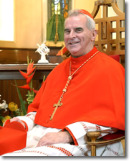Cardinal Keith O’Brien (pictured) of St. Andrews and Edinburgh has accused the BBC, the world’s largest broadcasting organization, of anti-Christian and anti-Catholic bias.
bias.
In an interview with The Sunday Times last weekend he stated: “Our detailed research into BBC news coverage of Christianity in general and Catholicism in particular, together with a systematic analysis of output by the Catholic Church, has revealed a consistent anti-Christian institutional bias.”
“Senior news managers have admitted to the Catholic Church that a radically secular and socially liberal mindset pervades their newsrooms,” he added, saying, “this sadly taints BBC news and current affairs coverage of religious issues, particularly matters of Christian beliefs.”
Cardinal O’Brien believes that atheist commentators such as Richard Dawkins are given a disproportionate amount of airtime while Christian views are often marginalised. He is also concerned by a 15 per cent slump in religious programming over the past 20 years and believes the broadcaster should appoint a religion editor to address this decline.
He stated that, “senior news managers have admitted to the Catholic church that a radically secular and socially liberal mindset pervades their newsrooms…This sadly taints BBC news and current affairs coverage of religious issues, particularly matters of Christian beliefs.”
Cardinal O’Brien joins the Church of England in calling for the BBC to appoint a religion editor to monitor the corporation’s coverage of faith issues. The Rt. Reverend Nigel McCulloch, Bishop of Manchester and the Church of England’s spokesman on communications, made the request last month in a submission to the BBC Trust’s ongoing review of BBC Radio 3, BBC Radio 4 and BBC Radio 7. He wrote: “We see no logical distinction between the genre of arts, science and business (all of which include reflecting and discerning between different opinions and perspectives, and have BBC editors) and that of religion.”
Cardinal O’Brien also expressed fears that a BBC documentary on Pope Benedict XVI, scheduled for the start of the papal visit to Great Britain, would be a “hatchet job.” The programme, which charts the clerical child abuse scandal, was made by Mark Dowd, a homosexual former Dominican friar. It will be aired on September 15.
The BBC dismissed Cardinal O’Brien’s criticism of its religious coverage. A spokeswoman said: “The BBC’s commitment to religious broadcasting is unequivocal. BBC news and current affairs has a dedicated religion correspondent, and works closely with BBC Religion, ensuring topical religious and ethical affairs stories are featured across all BBC networks.” In response to the Cardinal’s attack on the forthcoming documentary by Mr. Dowd, she said: “Mark is just one presenter in a range of programming that will include live news and events coverage of the visit itself, and other documentaries across radio and TV.”
This is not the first time that the BBC has been accused of such bias: in 2006 a host of BBC executives and presenters admitted such bias in a leaked account of a BBC “impartiality summit.”
Of this summit, one veteran BBC executive said: “There was widespread acknowledgement that we may have gone too far in the direction of political correctness… Unfortunately, much of it is so deeply embedded in the BBC’s culture, that it is very hard to change it.”
Political pundit Andrew Marr said: “The BBC is not impartial or neutral. It’s a publicly funded, urban organisation with an abnormally large number of young people, ethnic minorities and gay people. It has a liberal bias not so much a party-political bias. It is better expressed as a cultural liberal bias.”















